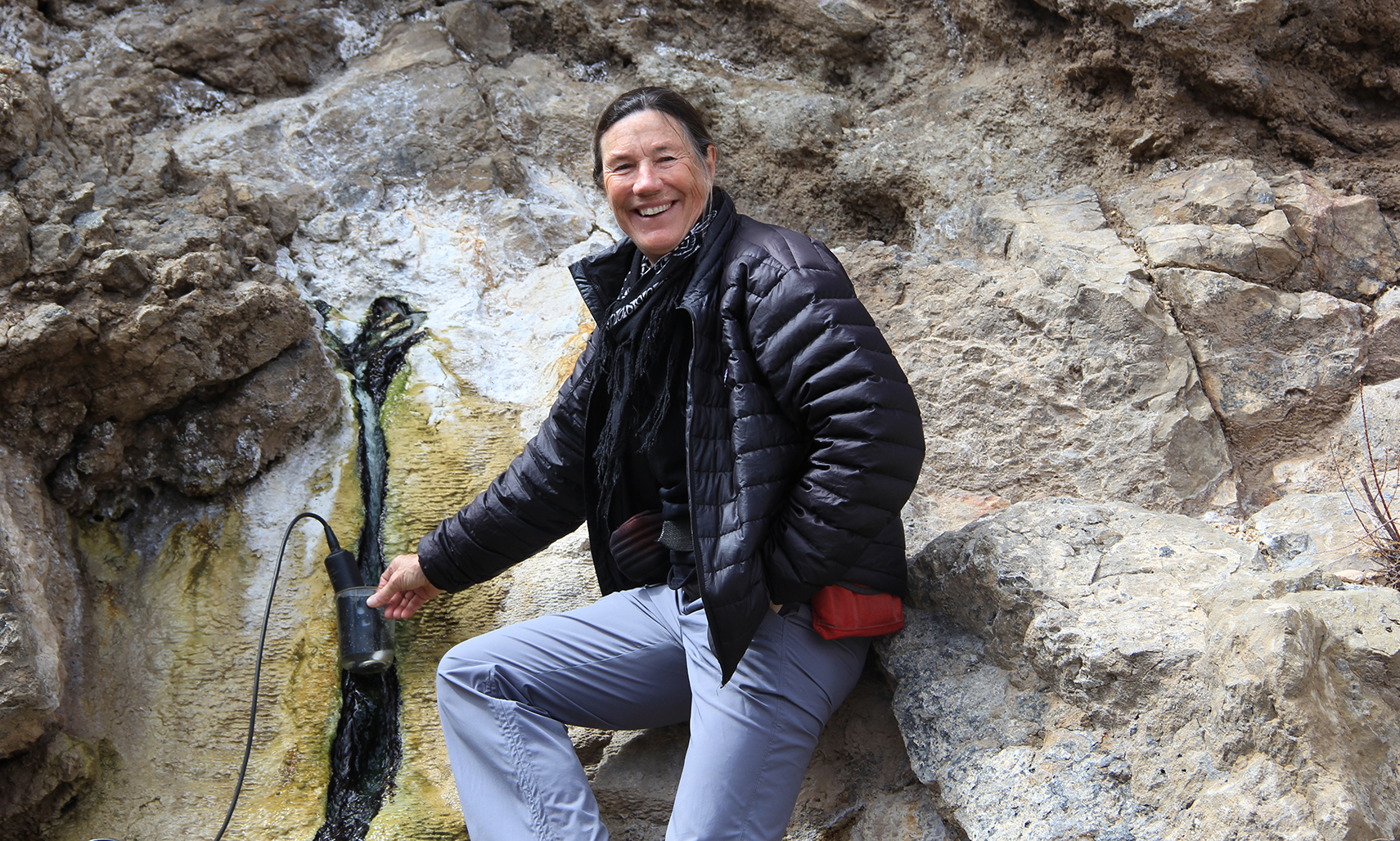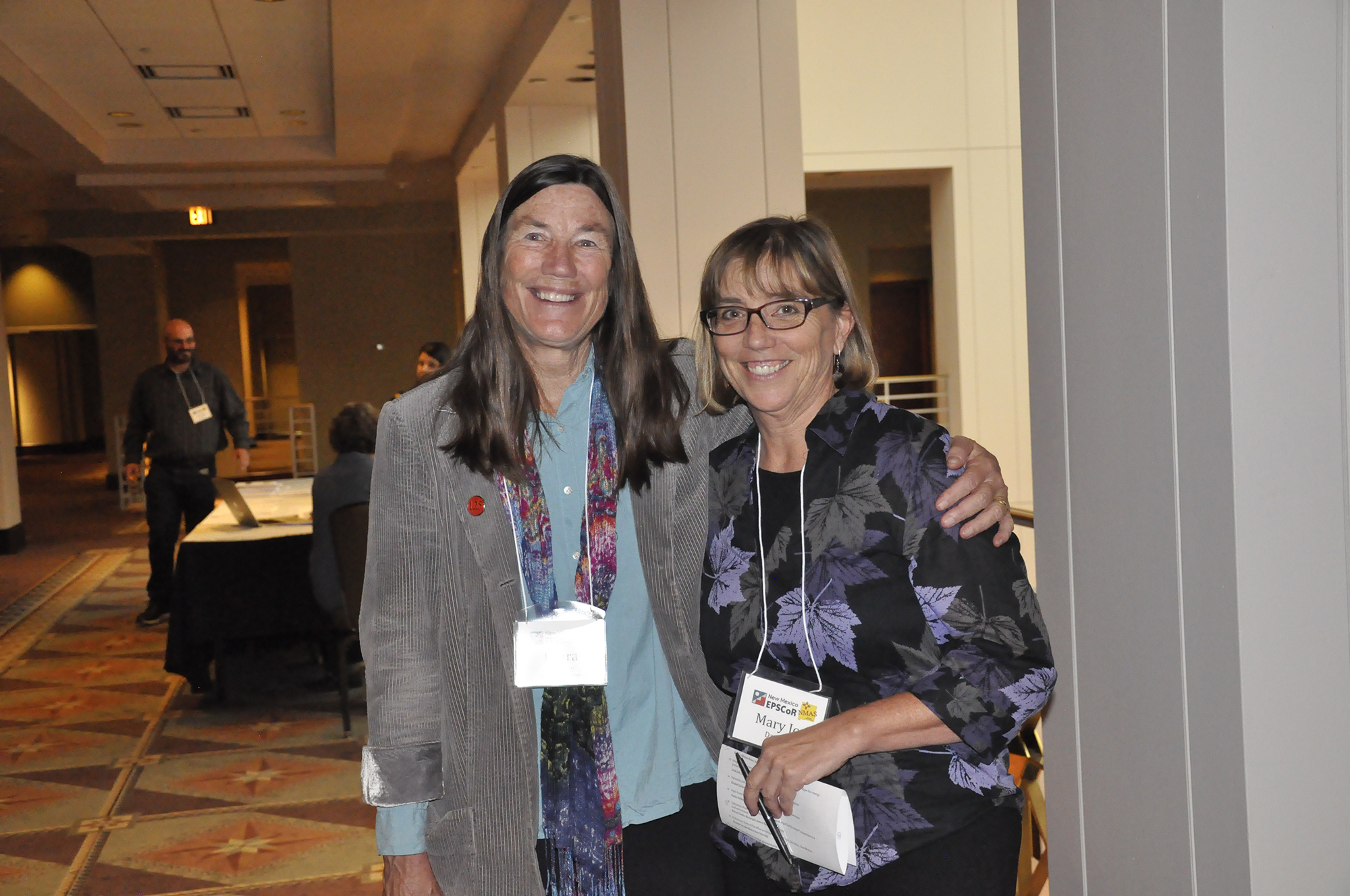NEWS
Pioneering Geoscientist Professor Laura Crossey Retires from University of New Mexico

Professor Crossey posing with monitoring equipment during field trip in 2015
NM EPSCoR
3 minutes
By
Brittney Van Der Werff
After a remarkable four-decade career marked by groundbreaking research, educational leadership, and a commitment to diversity in scientific fields, Professor Laura J. Crossey, a distinguished professor of Earth & Planetary Sciences at the University of New Mexico (UNM), retired in January 2025.
Throughout her illustrious career, Crossey was a pivotal figure in New Mexico's scientific community. Her contributions to NM EPSCoR span multiple projects that advanced understanding of critical environmental and energy challenges and opportunities in New Mexico.
A Legacy of EPSCoR Contributions
Crossey's involvement with NM EPSCoR dates back to 2005, when she collaborated on the second major project, RII2: NM NEW, addressing nanotechnology, education, and water.
From 2008 to 2013, Crossey played a key role in the RII3: Climate Change Impacts on New Mexico's Mountain Sources of Water. Her contributions included developing and deploying water quality sensors for autonomous monitoring of high-altitude stream waters. This innovative approach provided critical insights into water chemistry dynamics, shedding light on the complex interactions between climate change, water sources, and ecosystems in New Mexico's mountainous regions.
Between 2013 and 2017, Crossey continued her NM EPSCoR involvement as part of the Western Tri-State Consortium (WC-WAVE), a collaborative effort with NSF EPSCoR programs from Idaho and Nevada. This project focused on developing computational and visualization tools to understand hydrological impacts on snow-dominated watersheds in the western United States.

As part of the next large project, RII4: Energize New Mexico, from 2013 to 2018, Crossey served as UNM lead for the Geothermal Energy Team. Her contributions ranged from directing the team’s research efforts to volunteering for Teen Science Cafés and leading undergraduate geothermal course field trips.

Credit: NM EPSCoR
A Passionate Advocate for Diversity and Education
Throughout her career, Crossey was a passionate advocate for increasing minority participation in science. For over 20 years, she was the UNM Institutional Coordinator for the Louis Stokes Alliance for Minority Participation (New Mexico AMP) undergraduate research program, and in 2010, her efforts led to the funding of the Bridge to the Doctorate program, for which she was principal investigator.
Notable Achievements
Crossey's numerous local and national honors include being named a Distinguished Professor in 2021, selected as a Fellow of the Geological Society of America in 2008, winning the 2015 WSE IMPACT! Award, and being recognized as a Fellow of the American Association for the Advancement of Science in 2019. Her research has spanned diverse areas, from studying groundwater systems in the Grand Canyon to investigating tectonic plate interactions in Tibet and contributing to Mars rover research.
A Trailblazing Academic Leader
Crossey made history at UNM as the first woman to be tenured and the first woman to chair the Department of Earth and Planetary Sciences. Her exceptional leadership extended to serving two separate terms as Associate Dean in the College of Arts and Sciences, first as Associate Dean for Academic Affairs and later as Associate Dean for Research.
A Lasting Impact
One of Crossey's most public-facing achievements is the "Trail of Time" at Grand Canyon National Park, which she co-created with her husband, Karl Karlstrom. A permanent self-paced walking trail, this science communication gem reaches millions of people every year, and the National Association for Interpretation awarded the trail first place in the 2011 Interpretive Media category, soon after the trail was completed. The exhibition has become part of the training every National Park Service ranger undergoes when they are hired for a permanent position.
"Professor Crossey's dedication to advancing scientific knowledge and promoting diversity in STEM fields has left an indelible mark on our institution and the broader scientific community in New Mexico" said Selena Connealy, Associate Director of NM EPSCoR. "Her legacy will continue to inspire future generations of researchers, and we are forever grateful for her contributions to the NM EPSCoR community."
As Professor Crossey begins her well-earned retirement, her legacy of scientific excellence, interdisciplinary research, and commitment to expanding opportunities in science will continue to inspire future generations of researchers at the University of New Mexico and beyond.